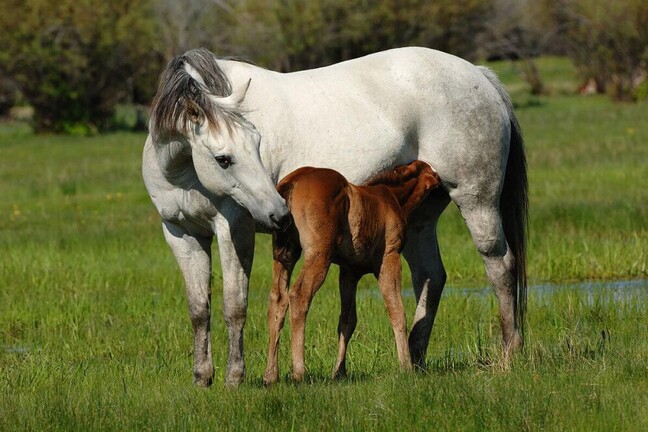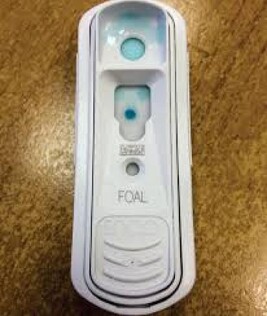Foaling Season is just around the corner and we are waiting anxiously for the deliveries of the mares we bred last season.
Many people choose to send their mares to stud to foal down - a wise choice if you value your sleep at this time of year! If you are foaling your mare at home, there are a few important milestones that your foal needs to reach in the first few hours of life to ensure they are off to the best start they can be.
Getting your foal off to a great start begins prior to the foaling event. Mares that have been previously vaccinated for tetanus should have a booster vaccine administered 4 weeks prior to their expected foaling date. This increases the amount of antibodies available to the foal in her colostrum for protection in the first month of life. Mares should also be wormed 4 weeks prior to foaling to reduce worm burden that then may be passed to the foal. Providing the mare with a clean, safe environment in which to foal is also very important.
You should make every effort to be present at the foaling of your mare - the use of foaling alarms definitely aids in ensuring that this occurs. Being present enables you to intervene if everything is not progressing smoothly and it also allows you to accurately assess the time of birth of your foal. See Megan’s article for more information regarding the foaling event.
Following the birth of the foal, the 1-2-3 rule is useful.
- The foal should stand within 1 hour of birth
- The foal should nurse from the mare within 2 hours of birth
- Meconium (first black faeces) should be passed within 3 hours of birth
These milestones are all very important and if your foal is lagging behind, please contact your vet immediately!
The Importance of Nursing
When foals are born, their immune system is completely naive as the antibodies from the mare cannot cross the placenta. Foals must ingest an appropriate amount of good quality colostrum ideally within the first 12 hours of life when the intestine is still able to absorb antibodies (mostly IgG). From 12 hours old, this ability reduces significantly until it is completely closed at 24 hours of age.
To test this, we can assess the amount of IgG in the foal’s blood. From 8 hours of age, we can perform a stall side test to make sure the foal is on track. The photo below shows a snap IgG test chamber.
If the foal is lacking at this stage, we have the opportunity to provide additional colostrum via stomach tube to boost IgG. This can come from the foal’s mother if she has good quality colostrum or if her colostrum is of poor quality then another mare’s colostrum can be used to substitute. After 24 hours of age, we can test exactly what the foal’s IgG level is via a blood test. If the foal is lacking at this stage, we can no longer supplement with further colostrum and have to perform a plasma transfusion. This involves directly administering IgG into the bloodstream of the foal.
Foals that have inadequate IgG levels are far more susceptible to infection and complications as they age. These consequences may not be immediately apparent but can develop over the subsequent weeks to months. Septic joints and other forms of sepsis are common in these foals and can be life threatening.
The Importance of Meconium
The foal’s first faeces are dark brown to black in colour and are either soft and pasty or firm balls. They should be passed within 3 hours of birth and getting up to nurse quickly will help to stimulate this to occur.
A meconium impaction occurs when the foal cannot pass the meconium. This can cause abdominal discomfort for the foal. Signs that this may be occurring include frequent posturing and straining to defaecate, flagging tail and abdominal discomfort. The foal may also become progressively lethargic and stop nursing.
Many mild impactions can be resolved with the use of an enema, allowing the faeces to pass through the rectum more easily. If administration of a commercial enema such as Microlax does not resolve the clinical signs, then your foal will require further treatment.
Tetanus Prophylaxis
Ideally, your mare would have received a booster tetanus toxoid 4 weeks prior to foaling. If your mare is not vaccinated or if she missed this vaccine, it is advised to administer a tetanus antitoxin (TAT) to your foal within 24 hours of birth. This injection is given under the skin and provides immediate protection to your foal during the first weeks of life.
Dipping the Navel
The foal’s navel can be dipped with a dilute chlorhexidine solution is recommended shortly after birth and can be repeated a few times a day in the following one to two days. Ensuring the mare and foal are in a clean environment will also help to prevent infection.
The Foal’s First Months of Life
Getting through the first few days smoothly is a big milestone, but you should continue to monitor your foal closely over the first weeks to months of his life.
Foals are very susceptible to dehydration if they stop nursing so any foal that is lethargic or off the suck should receive veterinary attention as soon as possible. If the foal has diarrhoea, this process can happen very quickly. Mild diarrhoea is normal around the mare’s foal heat (7-10 days after foaling).
Your foal will require his first drench between 8-12 weeks of age. The first drench should be a benzimidazole or ‘BZ’ based wormer. The main worms we are treating in this age of foals are ascarids, the long noodle-like worms that are sometimes passed in the faeces of young horses. From this age, foals should be treated every 8-12 weeks with an age appropriate wormer until 2 years of age. Faecal Egg Counts can also be performed at this interval.
From 3 months of age, your foal can receive his first tetanus vaccination. A sensitiser and booster vaccine are required at a four week interval initially. Another booster is given after one year before the foal moves on to a two yearly interval.
The clinic has foaling kits available for purchase, containing all the essentials for foaling your mare at home. Call the clinic on (03) 217 6688 if you have any questions or if you want to discuss newborn foal care with one of the team.
- Grace Reed


